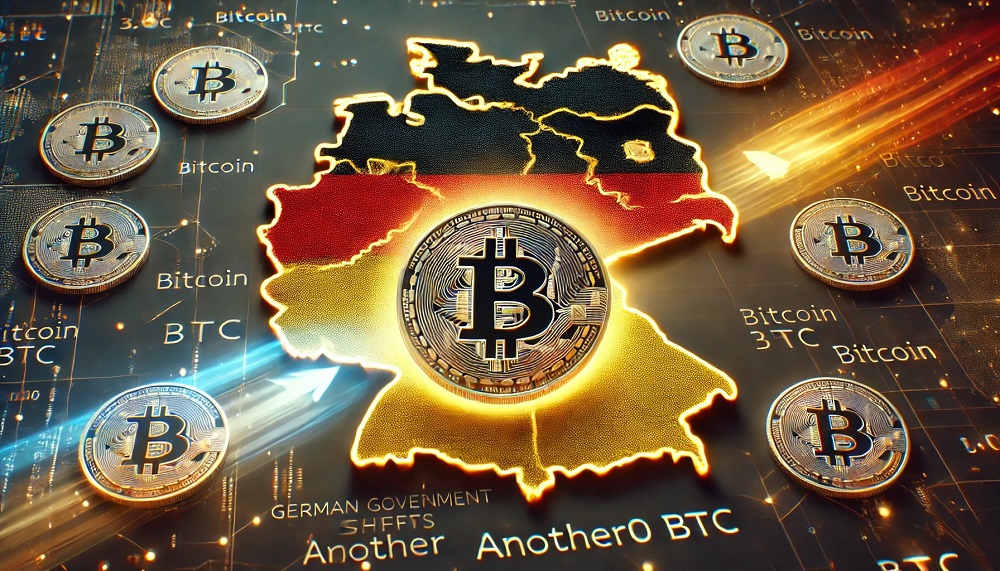The German government’s recent move to transfer over 3,000 Bitcoin (BTC) in an hour has sparked significant controversy. This activity is a continuation of last week’s BTC sales despite vocal opposition from certain parliamentary members.
In the past 24 hours, the German government has managed a combined inflow and outflow exceeding 6,000 BTC. More than half of this volume was shifted out of the government wallet, significantly impacting the BTC market.
The address, which initially held 35,488 BTC worth over $2 billion, received an inflow of 4,340 BTC. However, it moved over 3,000 BTC to exchanges or unknown addresses.
Disagreements on BTC Management Strategy
Meanwhile, Joana Cotar, a prominent German lawmaker and BTC advocate, has publicly urged the government to halt its unwarranted sale of state-owned Bitcoin. Cotar suggested that instead of selling off these assets, the government should adopt BTC as a “strategic reserve currency” to shield the nation from the volatility of the traditional financial system.
She believes that retaining BTC could help diversify Germany’s treasury assets, promote innovation, and serve as a hedge against inflation. Despite her statement, the government sold an additional $172 million worth of Bitcoin later that day.
At that time, the government wallet held over 42,200 BTC, valued at approximately $2.4 billion. As of now, the wallet holds slightly over 35,400 BTC, with a value of around $2 billion.
Gox Repayments Spark Further BTC Price Concerns
While the sell-off has raised concerns about the impact on the broader cryptocurrency market, the market is also facing sell pressure from the defunct crypto exchange Mt. Gox repayment. The Trustee overseeing the Mt. Gox repayments, Nobuaki Kobayashi, recently announced that repayments would strictly follow the Rehabilitation Plan.
According to recent data, the Trustee’s known addresses held over 94,400 BTC, with more than 47,000 BTC already moved. Analysts speculate that many of Mt. Gox’s former creditors might opt to sell their Bitcoin, given the over 8,500% rise in the digital asset’s value since the exchange’s collapse.
$441M Digital Asset Inflows
The latest market insights from CoinShares indicate an influx of $441 million into digital asset investment products over the past week. This surge, primarily driven by BTC’s price drop, Mt. Gox, and the German government’s sell-offs, highlights an unpredictable period for the crypto market.
According to the report, Bitcoin (BTC) noted an inflow of $398 million, accounting for roughly 90% of the total inflows. Notably, the inflows predominantly come from the United States ($384 million). Other notable contributions came from Canada ($12 million), Switzerland ($24 million), and Hong Kong ($32 million).
Besides Bitcoin, other digital assets also recorded notable inflows. Solana (SOL) attracted $16 million. These inflows make SOL the best-performing altcoin for the week and bring its year-to-date inflows to $57 million.
Ether (ETH) achieved $10 million in inflows. Meanwhile, the Sentinel Action Fund, a pro-crypto political action committee, doubled its donations to support four pro-crypto United States Senate candidates.
Bitcoin’s Open Interest Falls
Meanwhile, Bitcoin’s total open interest has decreased from $10.29 billion to $10 billion, with $148 million in BTC liquidations over the past day, according to Santiment. Coinglass reports $100 million in short and $48 million in long BTC positions were liquidated in the last 24 hours, including a $22.24 million BTC-USDT swap on OKX.
Santiment’s data shows Bitcoin’s Relative Strength Index (RSI) at 30, indicating it is oversold and might see a short-term price increase. Additionally, data from Santiment shows that transactions involving at least $100,000 worth of Bitcoin plummeted from 11,648 to 6,063, indicating a significant decline in whale activity.
